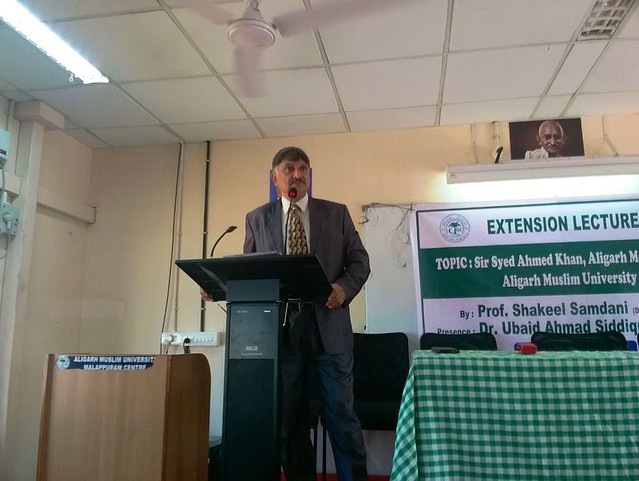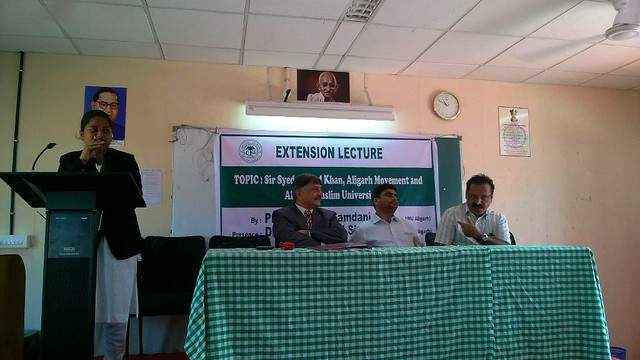By TCN News,
Malappuram: The Department of Law, Aligarh Muslim University Malappuram Centre organized an extension lecture on “Sir Syed Ahmad Khan, Aligarh Movement and the Aligarh Muslim University”. Professor Shakeel Ahmed Samdani, Department of Law, AMU and University Estate Officer (Gazetted) AMU Aligarh, delivered the keynote lecture.

Prof. Shakeel Samdani delivering an extension lecture at AMU Malappuram Centre
Highlighting the contributions of Sir Syed Ahmad Khan, Professor Samdani said that it was his commitment and sincerity which played a crucial role in the establishment of the Aligarh Muslim University. He said that Sir Syed was the first Indian educationist to visit England who keenly studied Oxford and Cambridge Universities and tried to copy the their model system when he established the Mohammedan Anglo Oriental College. He was the first to make the education globalized in India, Professor Samdani argued.
He further added that to understand the educational policies of Sir Syed Ahmad Khan, we have to understand the failure of First War of Independence, popularly known as Indian Mutiny-1857. After its failure, Sir Syed did not revolt or give up hope but embarked upon a definite mission. He decided to empower his community with education to fight back and recover the lost grounds. He executed this holy task in a manner that bears no example in history. He not only devoted himself to this mission but successfully mobilized a vast majority of Muslims and Hindus alike to realize it. He succeeded in preparing a generation of Indians which not only fought against British in pre-independence days but also participated in nation building in post-independence India.

Professor Samdani said that establishment of MAO College accelerated the process of education in India and a number of educational institutions were established throughout the country.
Elaborating the lesser known aspect of Sir Syed’s life, Prof Samdani pointed out that he was instrumental in enactment of Stamp Act, 1882, (Registration of Documents and The Kazis Act, 1880, in British India. The Kazis Act empowers the state government to appoint Kazis for solemnization of marriages of the willing Muslims, etc.
Having a legal background, Sir Syed understood the importance of legal education at a time when nobody gave much importance to it.
Pointing out to the moral courage of Sir Syed, Professor Samdani said that Sir Syed in his book “Asbab-e-Baghawat-e-Hind” highlighted that one of the big reasons behind the revolt was that Indians were not involved in the administration and judiciary. Today we need the same strategy. We cannot achieve our goals and rights by shouting on streets but by adopting legal and constitutional ways.
Professor Samdani reminded the audience that the Aligarh Muslim University is not only an institution but a movement which was aimed at spreading education not only in India but all over the world. In this connection, it should be noted that the former Vice Chancellor Professor P.K. Abdul Azis took a monumental step by starting two new Centres at Malappuram and Murshidabad.
Professor Samdani said that the present Vice Chancellor, Lt. Gen Zameer Uddin Shah (Retd.) is trying his best to achieve the educational mission of Sir Syed. He pointed out that during Lt. Gen. Shah’s tenure, the campus is very peaceful and academic atmosphere is prevailing. Students are bringing laurels to the University in various fields.
He said that the Vice Chancellor has also given a new direction to the Aligarh Movement by establishing Kishanganj Centre in Bihar and starting B. Ed. course at Murshidabad, Mallapuram and Kishanganj Centres. Lt. Gen. Shah has strengthened the existing Centres and provided all support. He said that the noble work of Lt. Gen. Shah will be written in golden letters in history.
Professor Samdani said that it is indeed heartening to note that the present VC has recognized the need for good schooling of Muslim students and has decided to open Sir Syed Public Schools in every district of Uttar Pardesh to provide quality education.
He said that our constitution is a model document and India will always remain a secular state. Indian Muslims have been given adequate rights by the constitution and they should not only respect but also make efforts to materialize these rights. He said, “We can rightfully take pride in our Constitution”.

